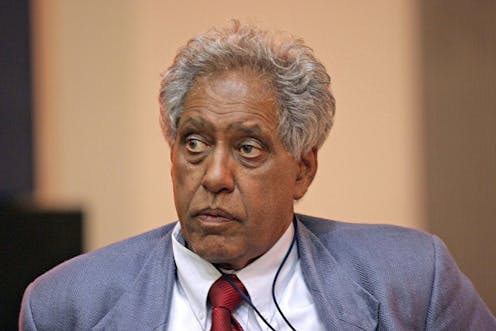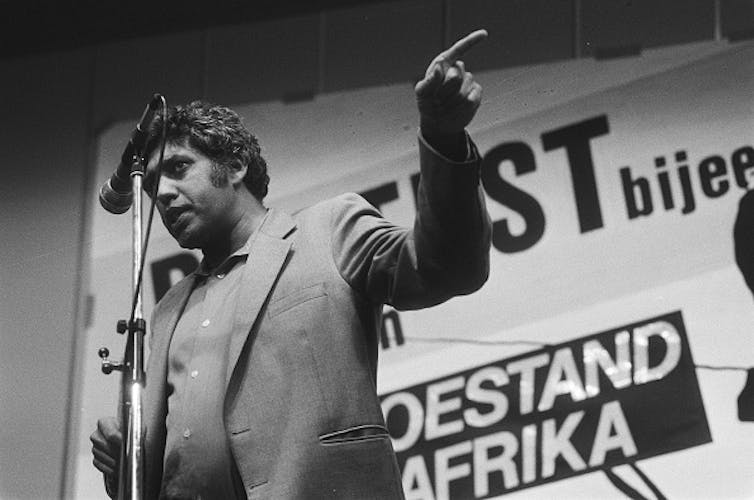
The death of South African freedom struggle stalwart Essop Pahad (84) on 6 July 2023 prompted tributes from his former comrades. There were also less respectful obituaries referring to him as Thabo Mbeki’s “consiglieri”, because of his role as the former president’s “right-hand man”.
Any examination of Pahad’s full political record will take you back to the heroic phases of South Africa’s liberation history, when prospects for a democratic South African government seemed very remote. As a teenager in the 1950s he was busy in the Transvaal Indian Youth Congress. This was the equivalent of the youth league of the liberation movement, the African National Congress (ANC), for Indian South Africans. In those days, reflecting apartheid’s distinctions, even radical resistance to it was racially differentiated.
He was one of a small group of activists who, in the 1950s and early 1960s, made a decisive contribution in pulling the Congress Alliance – a front of organisations allied to the ANC – leftwards, and encouraging an optimistic vision of a future non-racial South Africa.
In my own research on the South African Communist Party’s history, groups like the Transvaal Indian Youth Congress were game-changers. They were influential despite their small organised followings. Understanding Pahad’s political ascent helps to illuminate the history of the South African left and the wider liberation movement in which it immersed itself. He belonged to a political network constituted as much by friendships as shared ideas.
At the congress’s annual general meeting in 1958 he proposed a resolution on sport. Sadly, that is all the meeting’s agenda tells us. I’d like to think it was about cricket and its segregation, a key preoccupation for young Indian activists at that time, for Pahad was a lifelong cricket fan.
In old age he was a regular visitor to the Long Room at the Wanderers Cricket Stadium in Johannesburg, one reward for becoming a notable that he would enjoy. As a student at Sussex University between 1965 and 1970, he once organised a party for the visiting West Indian test side. Inheriting a family ethic of generous hospitality, he provided such a warm reception for the visitors that the following day they were so badly hungover they lost their match.
The early years
Pahad’s childhood was politically configured. His parents Goolam and Amina Pahad belonged to the group that directed the Indian congresses in the mid-1940s into confrontation with a government seeking to dispossess Indian landowners. Goolam was a successful businessman and he owned property in Sophiatown. Pahad employed ANC leader Walter Sisulu, supporting his efforts to become an estate agent.
Through Sisulu, the Pahads became friendly with the angry young men who would become ANC leaders in 1949, often providing them with food and a place to sleep so they could avoid late night pass law arrests for being in town after the curfew.
Even without guests, the Pahads’ apartment would have been crowded. Goolam and Amina Pahad had moved to the inner city of Johannesburg shortly after Essop’s birth in 1939 in Schweitzer-Reneke, in today’s North West province. They wanted good schooling for their five sons.
Both Essop and his younger brother Aziz did well enough to obtain entry to the University of the Witwatersrand. This was despite or perhaps because of their participation in one of the Congress Alliance-sponsored “Cultural Clubs” that were set to protest the introduction of the inferior Bantu Education for the black majority.
The clandestine Communist Party’s key theoretician Michael Harmel led the club that they joined. Perhaps through his agency, Pahad joined the party. The Transvaal Indian Youth Congress was led by party members and its political affiliations were very evident in its journal, New Youth. Pahad remained politically animated as a university student, joining the Transvaal Indian Youth Congress’ executive.
À lire aussi : How communists have shaped South Africa's history over 100 years
In mid-1962 he was arrested for trying to organise a strike, a contribution to the ANC’s continuing effort to secure a national constitutional convention. By this time he had formed a friendship with Thabo Mbeki, whom he got to know after they met at the Rand Youth Club, a key assembly point for activists, sponsored by Sisulu. Mbeki was then staying in Johannesburg, completing his A-levels through correspondence after expulsion from Lovedale College for leading a class boycott.
Exile years
Pahad’s friendship with Mbeki deepened when he joined him in Britain after his departure from South Africa in 1964, prompted by a banning order. Mbeki was enrolled at Sussex University and he persuaded Pahad to register. Pahad would complete an MA and a doctorate at Sussex between 1965 and 1971, producing a workmanlike dissertation about the South African Indian Congresses.

Mbeki also introduced him to Meg Shorrock, whom he married in 1966. That year with Mbeki he helped establish a non-racial ANC Youth and Student Section. He was immersed in campus student politics as well as organising Vietnam solidarity events. He spent a year in 1973 at the Institute of Social Sciences in Moscow.
Pahad’s most conspicuous activity during his exile was his deployment in Prague at the World Marxist Review; acknowledgement by the Communist Party of his status as a reliable theoretician. He and Meg lived in Prague between 1975 and 1985, and their two daughters were born there, attending Czech schools. I interviewed them in 2018 because I was exploring the South African Communist Party’s Czech connections.
The Pahads remembered a happy period of their life. They found plenty to admire in post-Prague Spring Czechoslovakia, though they both perceived that the Czech party had lost public support. Back in London, Pahad would work closely with Mbeki, acting as an intermediary in the discreet diplomacy that Mbeki was conducting with South African officials and businessmen.
Right-hand man
Pahad would return to South Africa in 1990 following the unbanning of the liberation movements, making a new home for his family in Johannesburg. Unlike Mbeki, Pahad remained a communist. One view of his continuing affiliation is that he remained in the party at Mbeki’s behest to watch over its internal affairs, but there is no reason to doubt his continuing commitment to communism. At that time Mbeki’s future succession to the presidency was uncertain and the party was one key constituency. But it is true that Pahad’s subsequent political career would be defined by his status as Mbeki’s trusted friend, his best man as it were, a function he actually performed at Mbeki’s wedding in 1974.
So, during the presidency of Nelson Mandela (10 May 1994-16 June 1999) he served as Mbeki’s “parliamentary counsellor”. He was essentially responsible for keeping the ANC House of Assembly caucus in order, and after Mbeki’s accession to the presidency, Pahad became a minister in the president’s office.
These were not posts that would define him as a policymaker. Rather his reputation as a member of government was as an “enforcer” quelling rebellion. “Who the fuck do you think you are, questioning the integrity of the government, the ministers and the president?”, he admonished the ANC members of the Select Committee on Public Accounts who wanted a full inquiry into the corrupt 1999 multi-billion-rand arms contract.
Subsequently he was a vigorous defender of Mbeki’s positions on HIV and Aids. Pahad himself believed that Mbeki was unfairly characterised as an Aids “denialist”.
Diligent
When Pahad was given a job, he did it efficiently. He surprised even his critics with the diligence with which he supported the offices placed under his authority as minister, for example urging municipalities to “mainstream” disability rights.
Characteristically loyal, he resigned when Mbeki was displaced in 2008.
In retirement he presided over the South African Democratic Education Trust, the incubator of a remarkably non-partisan multi-volume history of the liberation struggle, founded his own journal, The Thinker, and remained actively engaged on the editorial board of New Age, the newspaper funded by the Gupta family, which stands accused of orchestrating industrial scale corruption under former president Jacob Zuma.
He had invited Ajay Gupta to join the International Marketing Council in 2000, an appointment that he subsequently regretted. He may have had other personal regrets but unlike many of his comrades, he rarely spoke about his own political journey.
His life had its own integrity, defined by fixed loyalties and enduring friendships; not such a bad epitaph.
Tom Lodge ne travaille pas, ne conseille pas, ne possède pas de parts, ne reçoit pas de fonds d'une organisation qui pourrait tirer profit de cet article, et n'a déclaré aucune autre affiliation que son organisme de recherche.
This article was originally published on The Conversation. Read the original article.







